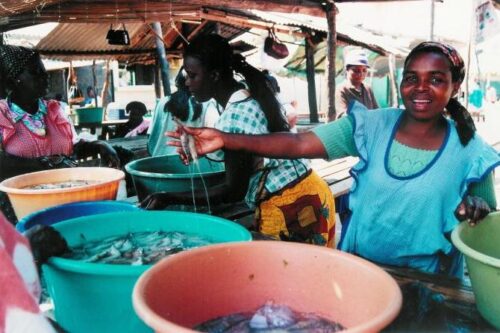The Market. Where Women Reign Supreme.
It is still dark when Esther rises. The children are still asleep and her husband murmurs something inaudible. Today is market day. She fills a large basket with produce from her field. She hopes to sell it and buy something for the house. Whatever the husband earns is his own and what she earns is for the house.
She sets out on her journey and meets Olete and Sammy on the road; they too are on their way to the market. It takes them three hours to reach the market and they find it already quite busy. She briefly greets the other vendors from nearby villages.
Esther and Olete take their places. For years, they have gone to the market on the same day and the same spot.
They lay out their goods while smiling and exchanging a few words of greeting like all the vendors. The topics are always the same: the children, the field, and the relatives.
One is immediately attracted by the sounds and colours of the market but what is unmistakeably immediately apparent is the large number of women. In actual fact, one essential characteristic of African markets is that they are exclusive places for women. It is the women who carry the goods to the market to sell them and buy others. A mere glance at the stalls shows they are all run by women. The men usually sit at the sides while they chat and discuss together as they create their network of social relations, but they never take part in the business. That belongs exclusively to the women. It is the woman who, using her savings buys a canopy for herself or others and so creates a fixed spot for herself in the market. The rest, who are the majority, only come occasionally and take whatever free spaces are left. Mary says: “What I earn is not an important part of the family finance, but it helps to keep things going and, most importantly, it brings in some cash for the family”.
For the most part, the entire produce of the fields is used for food, with no money to show for it. Thanks to the market and their work, the women manage to earn a little cash by transforming agricultural products into cooked food (polenta, manioc, beer made from sorghum, etc.). They may also exchange food for clothes, pots, batteries, or other useful objects. The majority of those tilling fields are women, even if the fields hardly ever belong to them. The women control 70% of agricultural production, produce 80% of food and ensure 90% of the commercialisation of these products.
Time passes under a scorching sun while the women sell their goods and chat together. It is late in the afternoon and time to go home. Esther goes to buy some things for the house and copybooks for her children. She joins Olete and Sammy for the journey home.
Once home, she greets her husband who smells of alcohol but fortunately has no reason to complain today. Electrical power has been turned off several hours ago. The power lines stop at the road, at the present time. Soon, the government will bring the power lines to the houses – or so they have been saying for years.
The day’s work is not yet done. She still has to prepare some food. At long last, she can unroll her sleeping mat at the foot of the table near the doorway. As she closes her eyes, she thinks of the day that is about to begin. She likes to think that when she falls asleep, a new day begins. This is her way of ensuring the new day begins well since it starts with the first peaceful hours of the night, the only chance she has to rest. Before dawn, the cock will crow, or the suffocating heat of her hut wakes her from her sleep and she is back to the long, hard, work-filled day of the African woman.
Mary Mutesa






